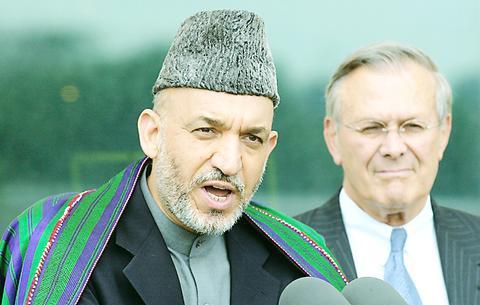Afghan President Hamid Karzai yesterday called on NATO to provide more peacekeeping forces for his country ahead of planned September elections, but said he was not seeking additional US troops.
Karzai and US Secretary of Defense Donald Rumsfeld, in an outdoor news conference at the spot where a hijacked plane slammed into the Pentagon on Sept. 11, 2001, also expressed confidence that Osama bin Laden, whose al-Qaeda network was blamed for the attack, will be captured, but did not guess when.
Karzai was scheduled to meet yesterday with US President George W. Bush.

PHOTO: REUTERS
After a meeting with Rumsfeld, who has visited Afghanistan six times, Karzai said he did not make a "specific request" for the US to add to the roughly 20,000 troops it currently has in Afghanistan.
"The United States is already busy in Afghanistan helping us in reconstruction, and helping us fight terrorism and helping us secure our borders," Karzai said.
But he said he expected NATO "to fulfill the promise that we have been made. We are hoping that NATO will come to Afghanistan especially before the elections of September."
NATO took charge of the International Security Assistance Force troops last year. The alliance leads roughly 6,000 peacekeepers concentrated in the capital Kabul and a small civilian-military team in the northern city of Kunduz.
But NATO has struggled to expand its peacekeeping operation into unruly provinces because of the reluctance of allies to commit costly military equipment such as helicopters and planes. Many NATO allies argue that their militaries are overstretched by operations around the globe, including in Iraq and the Balkans.
Karzai, picked to serve as president by a traditional Afghan council, is seeking election as president in the elections originally planned for June but now scheduled for September.
The US has doubled its troops in the country this year amid an intensified effort to track down al-Qaeda and Taliban fugitives, including bin Laden. US-led forces in 2001 toppled the Taliban regime, which had harbored al-Qaeda.
"All nations, yours and ours, have had fugitives in our histories. And has a fugitive run forever? No, at least not in my country," said Karzai, referring to bin Laden. "So he's a fugitive right now. He's hiding somewhere. And he's on the run. And we're after him. We'll catch him one day, sooner or later."
US officials have said they believe bin Laden is hiding in the rugged Afghan-Pakistani border areas.
Karzai also emphasized his commitment against the growing of poppies in Afghanistan, the world's top opium-producing country, but called for "strong, consistent international support." He did not elaborate or fault any specific country's efforts.
"The fight against poppies is the fight for Afghanistan. And no matter who or how, we will not allow this to continue. Poppies criminalize the Afghan economy. Poppies prevent the institution-building in Afghanistan. Poppies go hand-in-hand with terrorism," Karzai said.

Indonesia yesterday began enforcing its newly ratified penal code, replacing a Dutch-era criminal law that had governed the country for more than 80 years and marking a major shift in its legal landscape. Since proclaiming independence in 1945, the Southeast Asian country had continued to operate under a colonial framework widely criticized as outdated and misaligned with Indonesia’s social values. Efforts to revise the code stalled for decades as lawmakers debated how to balance human rights, religious norms and local traditions in the world’s most populous Muslim-majority nation. The 345-page Indonesian Penal Code, known as the KUHP, was passed in 2022. It

‘DISRESPECTFUL’: Katie Miller, the wife of Trump’s most influential adviser, drew ire by posting an image of Greenland in the colors of the US flag, captioning it ‘SOON’ US President Donald Trump on Sunday doubled down on his claim that Greenland should become part of the US, despite calls by the Danish prime minister to stop “threatening” the territory. Washington’s military intervention in Venezuela has reignited fears for Greenland, which Trump has repeatedly said he wants to annex, given its strategic location in the arctic. While aboard Air Force One en route to Washington, Trump reiterated the goal. “We need Greenland from the standpoint of national security, and Denmark is not going to be able to do it,” he said in response to a reporter’s question. “We’ll worry about Greenland in

PERILOUS JOURNEY: Over just a matter of days last month, about 1,600 Afghans who were at risk of perishing due to the cold weather were rescued in the mountains Habibullah set off from his home in western Afghanistan determined to find work in Iran, only for the 15-year-old to freeze to death while walking across the mountainous frontier. “He was forced to go, to bring food for the family,” his mother, Mah Jan, said at her mud home in Ghunjan village. “We have no food to eat, we have no clothes to wear. The house in which I live has no electricity, no water. I have no proper window, nothing to burn for heating,” she added, clutching a photograph of her son. Habibullah was one of at least 18 migrants who died

Russia early yesterday bombarded Ukraine, killing two people in the Kyiv region, authorities said on the eve of a diplomatic summit in France. A nationwide siren was issued just after midnight, while Ukraine’s military said air defenses were operating in several places. In the capital, a private medical facility caught fire as a result of the Russian strikes, killing one person and wounding three others, the State Emergency Service of Kyiv said. It released images of rescuers removing people on stretchers from a gutted building. Another pre-dawn attack on the neighboring city of Fastiv killed one man in his 70s, Kyiv Governor Mykola